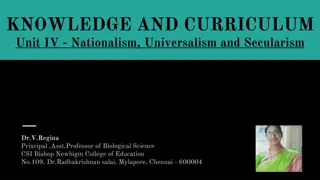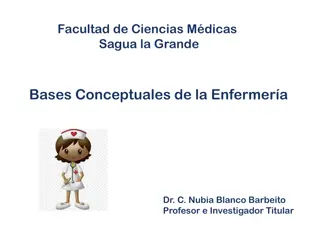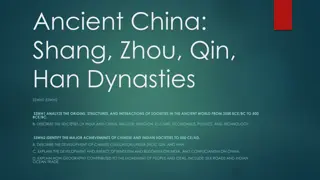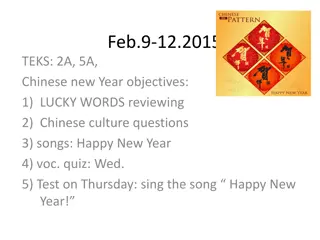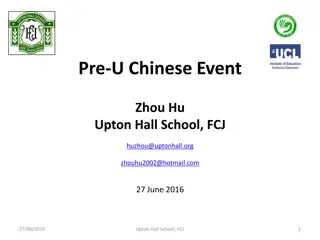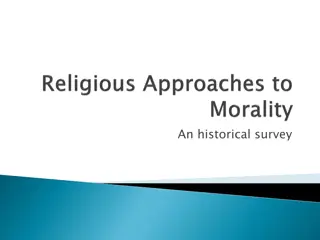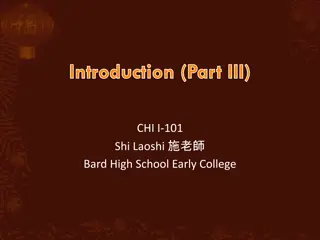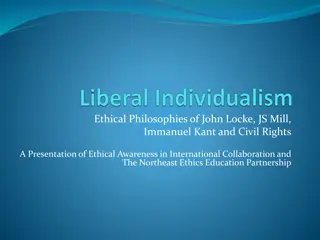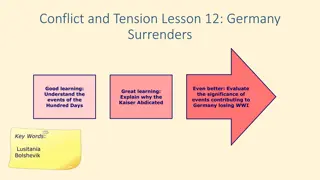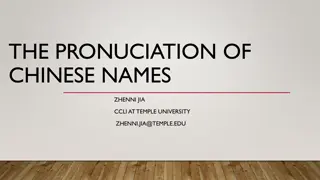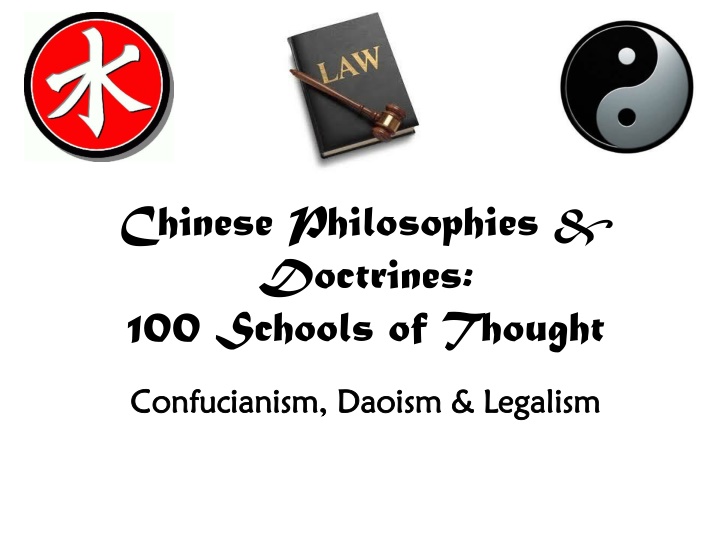
Confucianism: Ancient Chinese Philosophy
Delve into the world of Confucianism, a prominent Chinese philosophy emphasizing social harmony, good governance, and ethical conduct. Explore the principles of the 5 Basic Relationships and learn how they shape the dynamics of society according to Confucian teachings.
Download Presentation

Please find below an Image/Link to download the presentation.
The content on the website is provided AS IS for your information and personal use only. It may not be sold, licensed, or shared on other websites without obtaining consent from the author. If you encounter any issues during the download, it is possible that the publisher has removed the file from their server.
You are allowed to download the files provided on this website for personal or commercial use, subject to the condition that they are used lawfully. All files are the property of their respective owners.
The content on the website is provided AS IS for your information and personal use only. It may not be sold, licensed, or shared on other websites without obtaining consent from the author.
E N D
Presentation Transcript
Chinese Philosophies & Doctrines: 100 Schools of Thought Confucianism, Daoism & Legalism Confucianism, Daoism & Legalism
Confucianism 522 B.C.E- Confucius begins to teach (Founder Kongfuzi...Confucius) Taught social harmony and good government would come to China if people lived according to principles of ethics, good conduct and moral judgment Do not do unto others as you would not want others to do unto you
Main Beliefs Focus on Harmony in Society through 5 Basic Relationships: Ruler/Subjects Parent/Child Husband/Wife Old/Young Friend/Friend
5 Basic Relationships Each relationship had certain responsibilities to follow (479 B.C.E- teachings were collected into works called Analects) All relationships (except the last), involve the authority of one person over another Power and the right to rule belong to superiors over subordinates Each person has to give obedience and respect to "superiors The "superior," however, owes loving responsibility to the inferior and must set a good example
5 Basic Relationships Ruler Acts justly Strives to improve the welfare of his people Is worthy of loyalty Subjects Are loyal Serve their ruler Honor their ruler because of his position and character
5 Basic Relationships Parent (father) Is kind Gives protection Provides Education Child (son) Shows respect (filial piety) Accepts father s guidance Cares for him in old age and performs the customary burial ceremonies
5 Basic Relationships Husband Carries out his family duties Is honorable and faithful Provides for his wife and family Wife Looks after the home Is obedient Diligently meets the needs of her husband and children
5 Basic Relationships Elder (teacher, older brother) Sets an example of refinement and good behavior Shows consideration toward younger people Younger (student, younger brother) Respects the character and experience of the elder Defers to the advice of those with more experience Is eager to learn
5 Basic Relationships Friend Is equal to his friend and must have respect for him Friend Is equal to his friend and must have respect for him
Legalism Major Beliefs Founder- Hanfeizi (200 s B.C.E.) Like Confucianism stressed importance of an orderly society, but in the opposite way Belief in highly efficient and powerful government along with harsh law were the key to restoring power
Legalism Major Beliefs People were by nature selfish and untrustworthy thus peace and prosperity only achieved by threatening severe punishment
Daoism (Taoism) Daoist ideas traced to teachings of a scholar named Laozi 500 B.C.E. emerges as a major philosophy Emphasized harmony with nature- rejected formal social structures and idea that people must fill specific roles in society
Daoism (Taoism) People should renounce worldly ambitions and turn to nature and the Dao ( the Way ), universal force that guides all things Where Confucianism provided one s place in the social order, Daoism emphasized harmony within the individual, one could be both
Yin & Yang Chinese theory related to Daoism Two opposing forces believed to be present in all nature Yin- cool, dark, female, and submissive Yang- warm, light, male, and aggressive For harmony the two must be in balance
Practice: Who Said it? Confucianist Confucianist, Daoist or Legalist? , Daoist or Legalist?
Who Said It? Confucianist or Daoist or Legalist? Heaven is long lasting and earth is enduring. The reason why heaven and earth can live long and endure is that they do not live only for themselves. Daoist
Who Said It? Confucianist or Daoist or Legalist? To govern is to set things right. If you begin by setting yourself right, who will dare to deviate from the right? Confucianist
Who Said It? Confucianist or Daoist or Legalist? "The only way for a ruler to rule is with an iron fist and pen to write strict laws." Legalist
Who Said It? Confucianist or Daoist or Legalist? Indeed, customs differ between the past and the present. To try to govern the people of a chaotic age with benevolence and lenient measures is like trying to drive wild horses without reins and whips. Legalist
Who Said It? Confucianist or Daoist or Legalist? When the people are subjected to overmuch government, the land is thrown into confusion. Daoist
Who Said It? Confucianist or Daoist or Legalist? China without a recognizable leader is preferable to foreigners with all their leaders. Confucianist
Who Said It? Confucianist or Daoist or Legalist? The highest good is like water. Water benefits all things generously and is without strife. Daoist
Who Said It? Confucianist or Daoist or Legalist? Leave all things to take their natural course and do not interfere what is contrary to the Way soon perishes. Daoist
Who Said It? Confucianist or Daoist or Legalist? "People respond to punishment and rewards, not other people's behavior." Legalist
Who Said It? Confucianist or Daoist or Legalist? Sometimes I have gone a whole day without food and a whole night without sleep, giving myself to thought. It was no use. It is better to learn. Confucianist
Who Said It? Confucianist or Daoist or Legalist? When it comes to uncles, brothers, and chief vassals, he should punish them when their advice leads to failure, and promote them when their advice leads to success. He should not promote them erratically. Legalist
Who Said It? Confucianist or Daoist or Legalist? Let the sole worry of your parents be that you might become ill. Confucianist
Who Said It? Confucianist or Daoist or Legalist? Do not worry about NOT holding high positions; worry rather about playing your proper role. Confucianist
Who Said It? Confucianist or Daoist or Legalist? If the Way prevails on earth, horses will be used for purposes of agriculture. If the Way does not prevail, war-horses will be bred. Daoist


